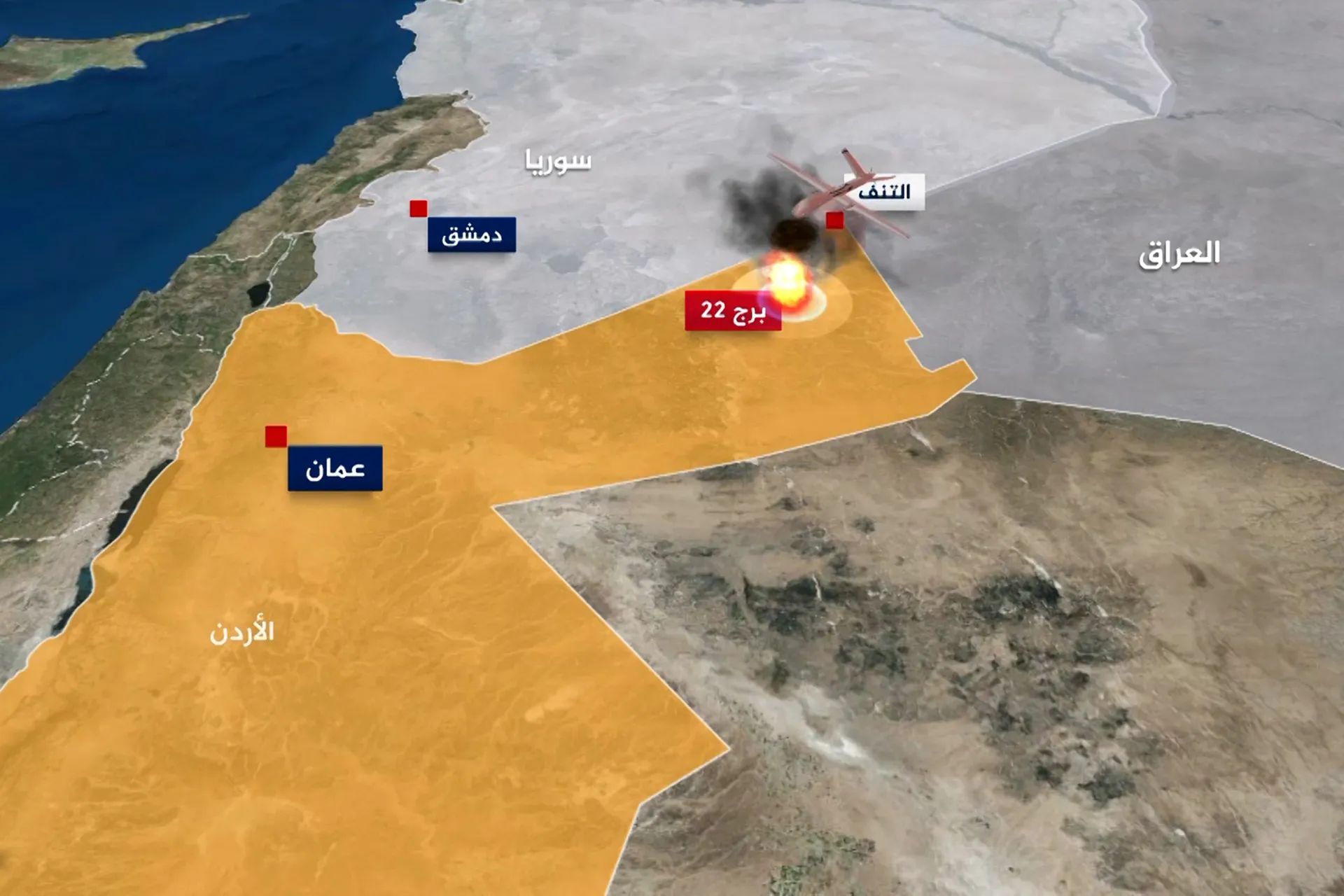The "Tower 22" base in Jordan killed 3 American soldiers and injured dozens (Al Jazeera)
After the killing of 3 American soldiers in Jordan as a result of the Israeli war on the Gaza Strip and the targeting of American interests in the region in response to support for Tel Aviv, Washington vowed to respond to the armed factions loyal to Iran that it accuses of the attacks.
What are the possible goals of this response, according to a report published by Agence France-Presse?
Which groups?
After the strike carried out by a drone on January 28 against “Tower 22”, a logistical support base in Jordan on the border with Syria, and the killing of 3 American soldiers for the first time in the region since the start of the war in the Gaza Strip on October 7, In the past, US intelligence services specifically pointed the finger at the "Islamic Resistance in Iraq", a group of widely influential Iraqi factions with close relations with Tehran.
US National Security Council spokesman John Kirby hinted that the Iraqi "Hezbollah Brigades," which is considered the most prominent faction in the "Islamic Resistance in Iraq," bears responsibility for the attack.
The "Islamic Resistance" claimed responsibility for dozens of attacks using drones or missiles on American soldiers in Iraq and Syria who are part of the international coalition against ISIS.
American forces have been subjected to more than 165 attacks since the start of the war on Gaza, which reveals the extent of escalating regional tension.
Among the factions that explicitly declared their affiliation with the "Islamic Resistance in Iraq" are the Al-Nujaba Movement and the Sayyid Al-Shuhada Brigades.
Washington classifies all of these factions that demand the departure of American forces from Iraq and stand in solidarity with the Palestinians against Israel as “terrorist” organizations.
These factions are also part of the Popular Mobilization Forces, an alliance of military groups that are part of the official Iraqi security forces.
What are the goals?
Over the past few weeks, Washington has bombed sites of Kataib Hezbollah and Harakat al-Nujaba in Iraq.
American forces said that they struck a "logistical support center for the Popular Mobilization Forces" in central Baghdad.
It also targeted the Jurf al-Sakhar area, which is a closed area protected by strict security measures where the activities of armed factions are concentrated and is located 60 kilometers south of Baghdad.
It also targeted the Al-Qaim border area, where there is an official crossing point for crossing into Syria, specifically to areas where pro-Iranian factions are located in the Syrian province of Deir ez-Zor.
Military expert Riyad Qahwaji says that the United States “may seek to strike weapons depots (in Iraq) and areas from which drones are launched, and will try to identify depots that contain missiles.”
In Syria, the areas where the Iraqi factions are located are located “mainly” in the eastern side of Syria close to the Iraqi border “in the Deir ez-Zor region (…) in Al-Mayadeen and Al-Bukamal, which are the two largest centers that can be targeted,” according to Qahwaji.
Director of the Syrian Observatory for Human Rights, Rami Abdel Rahman, says, “Deir ez-Zor city, the Palmyra desert in central Syria, which has airports from which drones fly, Al-Bukamal and Al-Mayadeen” are potential targets, noting that they are “the areas most (vulnerable) to targeting.” And “perhaps in A later stage, the Aleppo region in northern Syria.
Members of the Iraqi Hezbollah Brigades in a previous military parade in Baghdad (Iraqi Press)
Calm down
Abdul Rahman confirms that “many bases and sites of pro-Iranian fighters have been evacuated” in eastern Deir ez-Zor province. Meanwhile, “a large portion of the Iranian Revolutionary Guard officers withdrew to Damascus,” he said.
In similar measures in Iraq, Agence France-Presse reported, what it described as an official in an Iranian-backed faction, that he “took measures to confront American threats, by transferring some equipment and evacuating some camps to alternative locations.”
Another official said that "some field commanders" had moved to Iran, while others had moved to "safe locations," he said.
Despite Washington's vow of revenge, American officials reiterate that they do not want to reach a "wider war" in the Middle East. Tehran also denied being behind the attack that killed the three American soldiers and wounded dozens, and repeated that it was not seeking escalation.
At the end of last January, the Iraqi Hezbollah Brigades announced the “suspension” of its attacks against the American “occupation forces,” and called on its fighters to “passive defense if any hostile American action occurs toward them,” as it put it.
The Hezbollah Brigades statement absolves Iran of responsibility for the attacks, stressing that Tehran “objects to pressure and escalation against the American occupation forces in Iraq and Syria.”
The Al-Nujaba Movement issued a statement today, Friday, for its part, in which it pledged to continue attacks against American soldiers, and warned that “any (American) targeting will face a response that suits it.”
Yesterday, Thursday, US Under Secretary of State for Middle East Affairs Barbara Leaf criticized the attacks launched by the Iraqi factions and considered that they also constitute an “attack on the sovereignty” of the Iraqi state, and an infringement on its “control over weapons and national and foreign security policies.”
She confirmed that this file is subject to “vigorous consultations” with Iraqi officials. The American official called on the Iraqi authorities to control these groups, saying, "We would like to see more action."
Source: French

